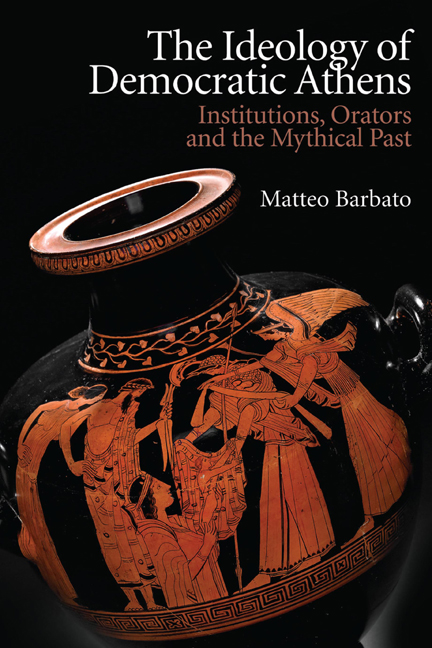Book contents
- Frontmatter
- Contents
- List of Tables and Illustrations
- Preface
- Abbreviations
- 1 Introduction
- 2 Myth and Athenian Democracy
- 3 The Discursive Parameters of Athenian Democratic Institutions
- 4 Exclusiveness and Eugeneia in the Myth of Autochthony
- 5 Between Charis and Philanthrōpia: The Heraclidae
- 6 Fading Shades of Hybris: The Attic Amazonomachy
- 7 Combining Hybris and Philanthrōpia: The Myth of Adrastus
- 8 Conclusions
- Bibliography
- Index Locorum
- General Index
- Frontmatter
- Contents
- List of Tables and Illustrations
- Preface
- Abbreviations
- 1 Introduction
- 2 Myth and Athenian Democracy
- 3 The Discursive Parameters of Athenian Democratic Institutions
- 4 Exclusiveness and Eugeneia in the Myth of Autochthony
- 5 Between Charis and Philanthrōpia: The Heraclidae
- 6 Fading Shades of Hybris: The Attic Amazonomachy
- 7 Combining Hybris and Philanthrōpia: The Myth of Adrastus
- 8 Conclusions
- Bibliography
- Index Locorum
- General Index
Summary
This book explored the construction of Athenian democratic ideology through a study of the social memory of Athens’ mythical past. I have shown that the ideology of democratic Athens was a fluid set of ideas, values and beliefs shared by the majority of the Athenians as a result of a constant process of ideological practice enacted by both the mass and the elite under the influence of the institutions of the democracy. This view combines the normative aspect and evolving nature of ideology typical of the Marxist tradition with the descriptive aspect and neutral notion of ideology held by the culturalist tradition. It also challenges the Marxist view of Athenian ideological practice as a top-down process (shared by de Ste Croix but notably rejected by Loraux) as well as Ober's bottom-up approach, and demonstrates that Athenian democratic institutions allowed both the mass and the elite to play an active role in the construction of the shared ideas and values of the community.
A series of key features of Athenian democratic ideology have thus emerged, among which its dynamic nature is probably the most notable. The influence of institutions allowed Athenian ideological practice to accommodate multiple and sometimes conflicting values and ideas. As shown in Chapter 5, for example, institutions enabled the Athenians to hold two potentially conficting values in their dealings with other communities: on the one hand, the importance of reciprocating the favours due to benefactors; on the other, the Athenians’ traditional humaneness (philanthrōpia), which consisted in acting as the righteous and altruistic champions of the weak. Both values coexisted in Athenian ideological practice but were appropriate to different institutions. In Euripides’ Children of Heracles, Iolaus thus relies on the significance of reciprocity (charis) in Athenian deliberative and honorific practice – which was the domain of the Assembly – to persuade Demophon to defend the Heraclidae in return for Heracles’ benefactions to Theseus. Under the influence of the state funeral for the war dead, Lysias’ Funeral Oration instead denies any reciprocal ties between Athens and the Heraclidae, and describes the Athenian intervention as an act of philanthrōpia.
Athenian ideas and values were themselves flexible and tended to adapt dynamically to different institutional settings of the democracy. This is best exemplified by the consistency between the two components of Athenian philanthrōpia – justice and altruism – in the myth of Adrastus (Chapter 7).
- Type
- Chapter
- Information
- The Ideology of Democratic AthensInstitutions, Orators and the Mythical Past, pp. 215 - 220Publisher: Edinburgh University PressPrint publication year: 2020

